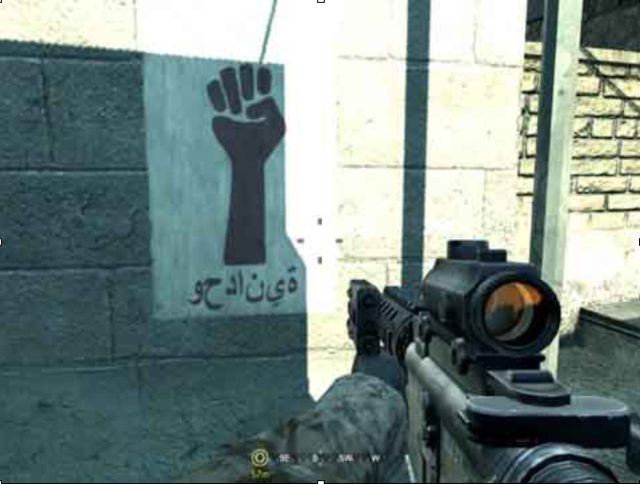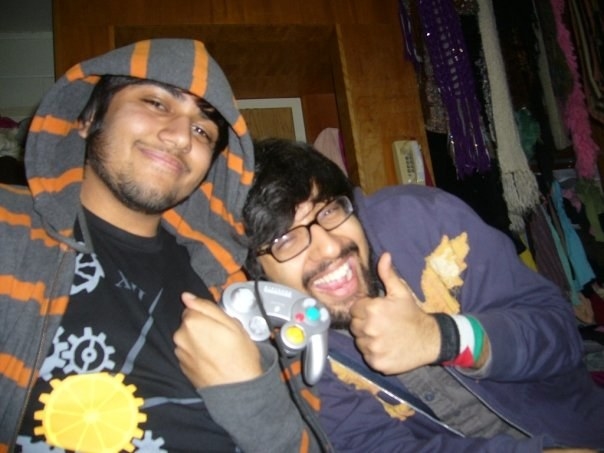This essay is part of a series from the BuzzFeed podcast "See Something Say Something" on "Call of Duty 4: Modern Warfare." Listen to the accompanying episode, "The Third-Act Nuke," here.
My parents had a habit of talking to the TV screen. We’d watch Nightly News every evening, hoping that Peter Jennings might finally use his precious half hour to highlight some crisis or suffering in the Muslim world. When he flashed occasional images of explosions in the West Bank or Bosnia, Ammi found it lacking. What about the bodies, Peter? she’d ask him. I was too young to really understand too much about why we cared what happened to people halfway around the world — people who were not even Pakistani like us — but I understood that somehow, they were our people too.
And so I remember very clearly when the first war came. It wasn’t actually our first one, of course — there had been the bombs in Bosnia, the Black Hawks in Somalia, the sanctions against Iran and Iraq — but the campaign in Afghanistan felt different to me. It had a name, for one — the War on Terror — which implied we were fighting an entity, rather than a country. The people we were fighting looked like people in my family: They shared our names and our religion. The effect of this on my life was almost immediate; friends and strangers alike began to sample new slurs, savoring the taste of “terrorist” and “towelhead” in their mouths. My classmates confidently sauntered up to me and asked if I knew where Osama bin Laden was hiding or if I was planning on blowing myself up.
In the coming years, I still watched the news with my family. When I grew tired of seeing “how the other side saw us” (as my mother put it), I’d run to the basement and boot up my PlayStation. But even that wasn’t safe. While there were plenty of racist caricatures in video games in the ‘90s, the Muslim terrorist trope began to increasingly assume central roles in a variety of shooting games. I mostly opted out of those games. It wasn’t like other games accurately reflected my reality or included Muslim characters I could relate to. But at least I wasn’t the villain.
In 2007, when I was a sophomore in college, Call of Duty 4: Modern Warfare was released on all major platforms. This installment of the long-running series featured a sophisticated, action-movie-like campaign and high-fidelity graphics. Earlier games in the COD series were set in WWII, but Modern Warfare’s genius was to give gamers a visceral look into modern anti-insurgency techniques and high-tech black ops. It was not the first game to introduce counterterrorism as its backdrop (Counter-Strike and Rainbow Six had that honor back in 1999); it simply elevated the formula and intensified the experience of War on Terror tactics that had been at the forefront of the American imagination for the past six years. The game was a massive success, selling 15.7 million units, solidifying the Call of Duty series as one of the most successful video game franchises of all times.
It felt like all the Muslim boys I knew were dedicated fans of the game, which I resented. At my Qur’an teacher’s house in Michigan, his daughter and my cousin would pass the controller back and forth. In Lahore, my nephews would spend half their time playing FIFA, and the other half sniping terrorists in the Middle East. Deferring to their uncle, they’d pass me the controller. I asked them: Doesn’t it feel weird to be playing a soldier engaged in warfare in Karachi, where we have family? Doesn’t it feel weird that the enemies of these games are from the Middle East, speak Arabic, and wear keffiyehs? I knew I was killing the vibe (I’m a terrible shot, too) so I put down the controller and vowed to never purchase a game in the series.
In Lahore, my nephews would spend half their time playing FIFA, and the other half sniping terrorists in the Middle East.
Like Bush before him, Obama’s policy was to rhetorically engage with the American Muslim community — in 2016, he criticized the lack of Muslim characters on TV unrelated to national security — while expanding military action against Muslims abroad, like the drone campaigns in Somalia, Yemen, and Pakistan. With Trump’s election, even the rhetoric of engagement feels distant, romantic almost. The reality is that, through three administrations, America has been continuously at war with various Muslim countries.
The Call of Duty series’ shift toward contemporary themes like radicalism, increasingly high-tech military technology, and destabilization of nation-states reflects that state of continuous warfare. It has been 10 years since the original Call of Duty: Modern Warfare was released, and Activision celebrated with a remastered, anniversary edition. With new US interventions in Syria and Afghanistan, I decided to face my fears and play Call of Duty’s version of the War on Terror.
The game begins with a blazingly fast mission report and training, quickly throwing me into a mission to get “the “package.” For my first taste of action, my team rappels down from a helicopter onto the deck of a ship. We land with a thud and perched at the end of my rifle sights are some sleepy-looking armed guards. My crewmates start firing. I’m caught totally off guard because the game provides no argument for killing these men. The game assumes you accept that with an operation like this there are casualties.
I begin firing, despite my hesitation, and probably miss every shot. The bridge (or whatever) is secure and the enemies dead. We scour the rest of the boat. We stumble upon some men sleeping in cots and execute them without question. By the time we take the brig, I’m getting nauseous. The game, revolutionary for its time, has a truly immersive feel. My view wobbles as the ship lurches and turns. I don’t know if it’s motion sickness or anxiety or guilt, but there’s a pit in my stomach and I decide I hate this. The nausea fades, but I don’t really ever start to enjoy the game. At this point, I have barely shot any bullets, since my computer teammates are cleaning up with brutal efficiency.

Unfortunately for my team, I am pretty bad at shooting people. For my first kill, I crouch accidentally and someone runs into me, his legs flashing in my vision. So I mash the right trigger and stab his knees. He falls and I ask myself, “Is he dead?” In real life, he’d have to bleed out painfully, but this dude is dead from a shiv to the shin. I double-check, because I’m in disbelief. The entire sequence is sloppy; I can’t tell who I’m killing or why. Near the end, I find a nuke, adorned with a violent-looking flag of scimitars and Arabic text that doesn’t resemble any real political groups.
Later, the narrative shifts to the Middle Eastern theater of war. Although the events that follow seem to be inspired by Iraq or Afghanistan, the map actually shows Saudi Arabia. This is so obscured I had to play this sequence twice to notice. A Saddam-esque revolutionary, Khaled Al-Asad, overthrows the government, which I find out during a sequence in which I play the only named noncombatant Arab character, President Yasir Al-Fulani (Saudi Arabia does not have anything resembling representational democracy). I watch, hands tied, as angry brown men in kaffiyehs execute civilians, shoot at the sky, drive tanks, yell in Arabic, and criticize my rule. It’s an incredibly intense sequence that ends with my execution at the hands of Al-Asad. Though you are given control of him, Al-Fulani, within the confines of the game, does nothing but die.
As my body falls to the floor, my perspective shifts to that of a coalition soldier. Soon I begin to blow a hole through the “Middle East,” searching hungrily for Al-Asad with my very sophisticated arsenal. I’m still not really sure why all this justified intervention.
At this point in the game, I lazily spray bullets into the battlefield and hope to kill my targets. Slowly, it becomes easier, even boring, to pull the trigger. The game provides cinematic, action-movie-style set pieces in between your kill sprees, but really, Modern Warfare is nothing more than a numbing sequence of firing ranges. The most difficult sequences are wet-work operations that involve patiently waiting to kill specific people as opposed to killing with abandon.
Eventually, after not-Saddam-Hussein dies, I find out the real villain is Imran Zakhaev, the head of a Russian splinter group. These individuals are not quite Communists, not quite Al-Qaeda. Instead, they’re Ultranationalists, a bunch of Soviet-revivalist goons with Muslim names and a desire to take over Russian and Middle Eastern governments. The game rarely asks questions about the merits of interventionism or gives you a clear sense of what either side wants — but twice, it gives you a reason to hate the Ultranationalists. First, with Al-Fulani’s death, and then second, with a nuclear attack in the Middle East, which kills the character you’re playing at the time, despite desperate efforts to survive.
Modern Warfare does contain some meditations about war and intervention: Every single time you fail an objective or die, lofty quotes about war appear — completely without context — as the level restarts.
"The soldier above all others prays for peace, for it is the soldier who must suffer and bear the deepest wounds and scars of war” from General Douglas MacArthur.
"Whoever stands by a just cause cannot possibly be called a terrorist," from Yasser Arafat.
“He conquers who endures,” from Persius.
After playing Call of Duty, I started wondering what Muslim kids growing up under this Trump generation and beyond will be called.
Does this game want us to consider ourselves, the soldiers, as conquerors? Or sufferers? And what of the casualties? There are minimal depictions of civilians getting killed (except a notable sequence involving a bombing raid from afar), so the game left me with the feeling that I was a hero for having killed all those brown men. I, after all, endured.
If the single-player game has a muddled relationship with war, the online multiplayer mode completely annihilates it, and that has always been the main appeal of the series. In a “deathmatch,” one team will play terrorists or Russians, while others play the assorted American and European forces, in a test of skill which makes every well-aimed head shot a show of dominance. As you eliminate the other team without losing lives, you unlock rewards, like a free Predator drone strike on your enemies. In Modern Warfare 2, when you’re ahead by 25 kills, you can nuke the whole battleground. In the logic of MW2 this action brings about a victory in the round, while in real life it would likely begin World War III. In plain terms, the most badass thing you can possibly do in the game is nuke the terrorists (and also your own team and all the civilians around you). It throws the concept of mutually assured destruction completely out the window.
I often mentally divide my family into two: those who were born when our parents were new immigrants to the country and those who were born after our family had lived a decade or longer in the States. I am the oldest of that second group; I never experienced the cultural impact of Operation Desert Storm, but I was old enough to experience the War on Terror. My sisters got called “camel jockeys” and “Saddam.” I was called "Osama" and "terrorist." After playing Call of Duty, I started wondering what Muslim kids growing up under this Trump generation and beyond will be called.
My younger cousins grew up in a world where, for most of their life, America was at war with the Muslim world; where the War on Terror had become mundane. I see them, many on their way to college, experiencing a transition similar to my own following 9/11. With the election of Donald Trump, they have found that the American government is on the domestic offensive as well; the ongoing War on Terror is now bolstered by consistent, explicit anti-Muslim rhetoric from the president himself. The young Muslims I know ask if America has space for them. Friends tell them they are the “good type of Muslim,” and that they only want to keep the bad ones out. People they've welcomed into their homes proudly tell them their family is a “Trump family.” They experienced anti-Muslim rhetoric in subtle ways before, but for once, they seem to have lost hope in the "American Experience" they had hoped for. We all probably should’ve known that integration was never an option for us. That was the bum message our parents were sold.
I think these young Muslims have a soft spot for Modern Warfare the same way I do for games like The Legend of Zelda: Ocarina of Time or Final Fantasy VII — playing such a technologically advanced game at 11 years old makes a huge impact. After I finished Modern Warfare, I asked my cousins what they thought about the series 10 years later. Surprisingly, they had the same concerns as I did (probably, they had picked up on my questioning over the years). They gravitated toward the game as young kids for the reason most young kids do — it was popular. They admitted that, though the story mode may have seemed fun at the time, they were a little uncomfortable storming through the Middle East killing Arabs. When I asked about this, they’d often say, “well, they’re Arab, but they’re communist Russian Arabs.” And then we laughed, because that is absurd.

It’s strange feeling that I, like many Americans, have probably watched war more through the lens of Modern Warfare than through real videos of bombing raids or civilian deaths in Iraq and Syria. First-person shooters are still as popular as ever, but the industry has moved on from the same beige, sandy depictions of war to futuristic settings like Advanced Warfare, Overwatch, or Destiny. My cousins haven’t stopped playing Call of Duty, but I find that as we talk more and they see anti-Muslim rhetoric creeping into their lives like it did into mine, they ask more questions of their media than before. They’re learning to talk back.
After the Iraq war began in 2003, my hippie friend and I drove over to City Hall and set up shop with homemade signs protesting the war. A few people honked their horns in support, but most of the time, they’d ignore us or hurl obscenities, or, in the case of my bowling coach, give me the finger (he didn’t recognize me, I’m sure). I remember this transition into political consciousness clearly. I remember feeling like I had to stand up against war, even though it meant people would question if I was a "real" American. I’m tired now, having seen things get worse. With Obama, the War on Terror receded into the background, our national, quasi-hidden shame. I’m not sure what questions the next eight years will bring. •
Want to hear more from me about playing Call of Duty 4: Modern Warfare as a Muslim? Listen to "The Third Act Nuke" episode by See Something Say Something.


